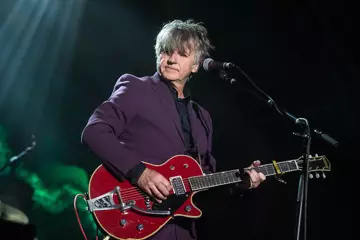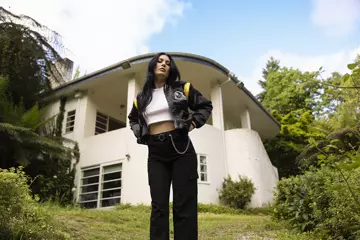 JD Samson
JD SamsonJD Samson, the one-time member of Le Tigre and leader of MEN, is coming to Australia to talk at the Face The Music conference, in an event co-presented by Melbourne Music Week. The 37-year-old has long been one of the music biz's most vocal, visible figures of feminist and queer issues, but being identified solely for such is something she's keen to put on the table.
"I really want to discuss the idea of being tokenised in the industry," says Samson, "and how it can be super-important to allow yourself to be that token. I've done so many panel discussions where people have actually said: 'we just need a woman'; 'we need a queer person'; 'we need a lesbian'. When I hear that stuff, it's frustrating. But it also makes me realise that it's important, in my activist work, to be that person, to be that token. I have to appreciate that at least they stopped and thought enough to ask a woman, to ask a lesbian, to ask a gender-queer person. And often, if I don't do it, there's just going to be none of us on the bill."
"I have to appreciate that at least they stopped and thought enough to ask a woman, to ask a lesbian, to ask a gender-queer person."
Le Tigre were no strangers to such tokenism, especially locally. In 2005, the band toured as part of Big Day Out, one of but two token 'female bands' (alongside The Donnas) on a male-centric line-up. That tour became the central storyline of the 2010 documentary, Who Took The Bomp?: Le Tigre On Tour, which charted the band's final years on the road before going on indefinite hiatus in 2006. "That was a huge part of our band at the time, and, to be honest, part of our demise," says Samson. "That experience was really depressing for us, and really made us put a magnifying glass on who we were, and what the industry was doing at that time; and whether or not we wanted to travel around the world with bands we didn't fit in with, [performing for] fans that didn't want us to be playing, and with politics that were totally against what we stood for."
Samson joined Le Tigre in 2000, after an initial stint as visual artist and projectionist at their live shows; her role, initially, as "experimental filmmaker", before becoming part of the performative line-up. After the demise of MEN, she's since returned to her artistic beginnings; Samson speaking from the Headlands Center for the Arts, North of San Francisco, where she's working on a visual/audio performance piece, and an installation for the queer/experimental film jamboree MIX festival. This change in her career has come with a growing disillusion with the music industry and its attendant financial realities.
Don't miss a beat with our FREE daily newsletter
"In Le Tigre, we got paid well enough to totally survive while we were a band, both from record sales and touring," Samson offers. "With MEN, I saw the other side: we weren't really making much money, and I had to subsidise my music-making with other things. It put a lot of stress into my music-making, and made me try a lot harder to succeed. And I think that once you start making music as a business, you can lose the artistic nature of what you set out to do in the first place. Once you start deciding that your music is a product, this dark cloud starts looming above you."
"Sometimes I feel like 50 years of feminism has been erased by people yelling at each other on the internet."
MEN was initially founded as a collective that included Le Tigre's Johanna Fateman. But, soon it evolved into a Samson-centric project, based around both her public persona and the individual within. "In Le Tigre, there was definitely a lot of press about my facial hair and my gender expression," Samson says. "It helped a lot of other people — to see someone out there who was being themself and being applauded for that — but it also created this persona for me, this character, like a dual identity. I had given my body over to science, and it was no longer my own... [In MEN], I put my heart on my sleeve, and let people in on what was happening inside of me, as opposed to just continuing the outward conversation that people have had about me."
Throughout her career, Samson has endeavoured to "stay sincere and honest and sensitive", but the rise of social media outrage has given her trepidation about such honesty. "I've written some articles online that've been interestingly ripped apart," she says. "I think people now view political artists as if they're politicians; and anything they say publicly can be analysed and broken down. I think it's created a climate where people can be afraid to speak out about things, or can feel like they're walking on egg-shells. [It] makes me more afraid to speak out, because I fear that I'll say the wrong words. The more I read 'call out culture' comments, the more silenced I feel. Sometimes I feel like 50 years of feminism has been erased by people yelling at each other on the internet, refusing to listen to each other. But, ultimately, I think this new wave of communication, in 20 years we'll look back and say: 'We needed to go through that to get to here.'"















